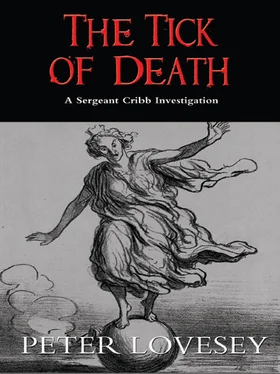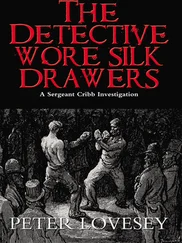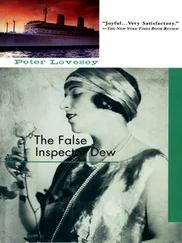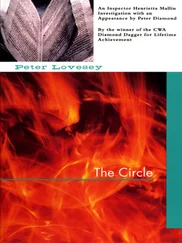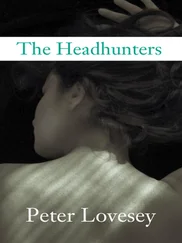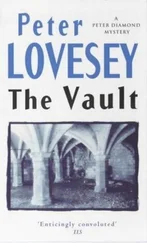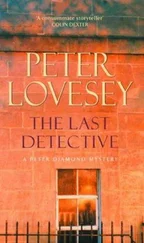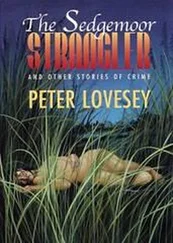Peter Lovesey - The Tick of Death
Здесь есть возможность читать онлайн «Peter Lovesey - The Tick of Death» весь текст электронной книги совершенно бесплатно (целиком полную версию без сокращений). В некоторых случаях можно слушать аудио, скачать через торрент в формате fb2 и присутствует краткое содержание. Жанр: Исторический детектив, на английском языке. Описание произведения, (предисловие) а так же отзывы посетителей доступны на портале библиотеки ЛибКат.
- Название:The Tick of Death
- Автор:
- Жанр:
- Год:неизвестен
- ISBN:нет данных
- Рейтинг книги:3 / 5. Голосов: 1
-
Избранное:Добавить в избранное
- Отзывы:
-
Ваша оценка:
- 60
- 1
- 2
- 3
- 4
- 5
The Tick of Death: краткое содержание, описание и аннотация
Предлагаем к чтению аннотацию, описание, краткое содержание или предисловие (зависит от того, что написал сам автор книги «The Tick of Death»). Если вы не нашли необходимую информацию о книге — напишите в комментариях, мы постараемся отыскать её.
The Tick of Death — читать онлайн бесплатно полную книгу (весь текст) целиком
Ниже представлен текст книги, разбитый по страницам. Система сохранения места последней прочитанной страницы, позволяет с удобством читать онлайн бесплатно книгу «The Tick of Death», без необходимости каждый раз заново искать на чём Вы остановились. Поставьте закладку, и сможете в любой момент перейти на страницу, на которой закончили чтение.
Интервал:
Закладка:
‘Might I suggest that you come and see for yourselves?’ said Rossanna. ‘If it is possible for the meeting to adjourn for a few minutes, I have hurricane lamps ready and we can walk down to the workshop and ascertain whether the Clan’s dollars have been wisely invested.’
‘Very well,’ said Carse. ‘Collect your hats, Brothers.’
Outside, the moon was obscured by a bank of cloud, so the lamps were necessary at once. Devlin led, the others filing after him in silence, impressed, it seemed, with the solemnity of the occasion. With the addition of a couple of spades, Cribb reflected, they could have passed for an exhumation-party.
They stopped at the door of the large building where Devlin’s team had been employed. Devlin produced a ring of keys and unfastened two locks. The door opened inwards and they passed inside.
Cribb first noticed a strong smell of tar. Then he was compelled to turn his shoulders and move sideways along the inner side of the building. The farther he penetrated, the narrower the passage became. The building accommodated an object of such proportions that it was impossible in that confined area to estimate its shape. All he could tell in the uncertain light was that the section nearest him was curved and made of riveted metal plates coated with tar. It rose above the height of his bowler.
‘Climb the step-ladder ahead of you, Mr Sargent, and you will get a better view,’ Rossanna’s voice advised him.
He found a ladder roped to part of the wooden framework that flanked the object. He climbed it and joined Devlin and Carse on a small platform, two planks in width. Devlin hooked his lamp on to one of the cross-beams above them, and Millar, who had appeared on a similar platform on the opposite side, did the same, so producing the best illumination possible in the circumstances. The shadow of Rossanna, climbing the ladder on Millar’s side, danced to the swinging of the lamps.
Cribb still had difficulty in recognising the object. Its main section was in the shape of a cigar about thirty feet long, and there was a low turret-shaped superstructure in the centre.
‘There, gentlemen,’ said Rossanna, ‘you see the culmination of a year’s work.’
‘Nine years,’ Carse corrected her. ‘This was begun with John Holland’s work in New Jersey.’
‘Who is John Holland?’ Cribb enquired, hopeful that the answer might explain the purpose of the metal cigar.
‘Holland?’ said Devlin, in a tone suggesting that the question should not have been asked. ‘He is the fellow who has made the submarine boat a practical reality. An Irishman, born in County Clare, and a Fenian, thank God. He built his first with Fenian money as long ago as 1875, three years after he arrived in the States. The man has thought of nothing else but designing submarine boats since he was a boy in Liscannor. This is an improved version of the Holland III, known as the Fenian Ram. ’
‘It had better be improved,’ said Carse. ‘Sixty thousand dollars of the Skirmishing Fund went into the first three boats, for nothing more sensational than a few excursions up the Passaic River.’
‘She has undergone two months of trials in the Estuary,’ said Devlin. ‘She is ready for whatever action is required of her. Would you care to see inside? There is a hinged lid, you see-’
‘That can wait,’ said Carse quickly. ‘How is she powered? With an oil engine, like the Ram? ’
‘Oh, no,’ said Devlin. ‘This vessel is electrically driven. She has two Edison-Hopkinson motors capable of developing up to forty-five horse-powers. Each one is powered by an Elwell-Parker battery with fifty-two accumulators. They produce a tension of 104 volts.’
‘It sounds capital,’ said Millar from the other side, ‘but as a man without much knowledge of electricity it doesn’t mean a damned thing to me, Brother. What’s her top speed below the surface, and how long can she stay under?’
‘She’ll do eight knots submerged,’ said Devlin, ‘and she could stay under indefinitely. It’s the air the crew have to breathe that limits the length of the submersions.’
‘Limits them to what?’ asked Millar.
‘I would estimate two hours with a crew of three.’
Millar and Carse exchanged glances. ‘That should suffice,’ said Carse. ‘How deep can she dive with safety?’
Devlin tapped the hull of the submarine boat with his shoe. ‘She’s constructed of Siemens-Martin steel plates five-sixteenths of an inch thick. They’ll withstand the pressure fifty feet down, if necessary. And she can hide in ten feet of water. I can give you a demonstration tomorrow.’
‘That won’t be possible,’ said Carse. ‘We shall have to take your word for it that everything is in order. But as you were selected for this assignment on account of your knowledge of Holland’s work, we have every confidence in you, Brother.’
Rossanna spoke. ‘If you have seen enough, gentlemen, shall we return to the house? There is still my father’s plan to expound.’
They shortly resumed in the dining room, where a large chart of the river between Erith Reach and The Lower Hope was spread across the table. McGee, masked as usual, was seated at the head. At Rossanna’s reappearance, he started babbling incoherently. She took his hand in hers and quietened him, but not before Millar had taken Cribb aside. ‘Is he always like this?’ he asked.
‘It’s a speech impediment,’ said Cribb. ‘The legacy of his accident.’
‘Poor beggar! You wouldn’t believe there’s a brain still functioning behind that piece of silk.’
‘It’s hard to credit,’ Cribb agreed.
‘Come, Brothers, we have much to do,’ Carse called from across the table. ‘Sister McGee, we await your father’s report.’
Rossanna was on her feet. ‘Gentlemen, my father wishes to welcome you to this meeting of our camp, here in the enemy’s country. A year has passed since he left his brothers in New York and set sail for England with the object of putting John Holland’s work to practical use on this side of the Ocean. It has been a difficult year, blighted by adversity, but in all our work the flame of the cause has burned bright, never flickering, nor threatening to go out. Maimed as he is, crippled and bereft of speech, my father is still the revolutionary you commissioned to carry out the active work of the Clan. And he is proud to report that with the loyal support of other members of the group here present, not to say the practical assistance of patriots domiciled in London, he has brought his work to perfection.’
‘We shall form our own opinion about that,’ said Carse, without much charity. ‘What is the plan?’
Unperturbed, Rossanna continued: ‘Well, gentlemen, I think you know. Our purpose is assassination. We are pledged to take the life of a certain personage, to demonstrate the strength and resolve of the Irish movement. The difficulties of such a mission at the present time are legion. There is not a public figure in London, not one miserable undersecretary, who does not have his personal body-guard. You cannot get within a hundred yards of a public building with anything that distantly resembles an infernal machine.
‘But the more difficult the task is made, the more brilliant will its achievement seem. We have been compelled to answer English organisation with Irish genius. Our submarine boat gives us the means of penetrating the enemy’s defences by a route they cannot dream is possible. For many months, our agents have observed the passage of sea-going ships up and down the reaches of the Thames. It was thought at first that we might mount an attack with torpedoes on one of the vessels of the merchant fleet. Then a more audacious plan suggested itself. It is the custom for ships to anchor in Gravesend Reach to wait for the next tide for the last mile upriver. Outgoing vessels, too, break their journeys here for at least one tide to take on passengers. Gravesend has become the place for fashionable people to embark and disembark. They pass between the ships and Gravesend pier on small steam-launches. Mr Gladstone himself used Gravesend after his cruise in the Pembroke Castle with the Tennysons and Sir Donald Currie last September.’
Читать дальшеИнтервал:
Закладка:
Похожие книги на «The Tick of Death»
Представляем Вашему вниманию похожие книги на «The Tick of Death» списком для выбора. Мы отобрали схожую по названию и смыслу литературу в надежде предоставить читателям больше вариантов отыскать новые, интересные, ещё непрочитанные произведения.
Обсуждение, отзывы о книге «The Tick of Death» и просто собственные мнения читателей. Оставьте ваши комментарии, напишите, что Вы думаете о произведении, его смысле или главных героях. Укажите что конкретно понравилось, а что нет, и почему Вы так считаете.
